Ethiopia's Prime Minister Abiy Ahmed has been widely praised for introducing sweeping reforms aimed at ending political repression, writes BBC Africa editor Fergal Keane after visiting the country.
The crowd at the airport in Jimma in Ethiopia's Oromia region was handpicked and universally rapturous.
But these were not the praise-singing party hacks who so often grace the arrivals and departures of powerful men in Africa.
Men and women, old, young and very young - beaming babies were held above the crowd - had gathered to witness the arrival of a political sensation.
"We are so very happy," an elderly man shouted to me above the sound of the military band, "it is like a renaissance. We have waited so long for this."
Shift from autocracy
Then Abiy Ahmed was among us, descending the steps of his plane to delighted cheers, testing the nerves of his security detail as he reached into the crowd to kiss a baby here, embrace an old man there.
I was conscious of an extraordinary fusion between the driven energy of an individual and the hope of a nation. Africa has rarely seen anyone like him.
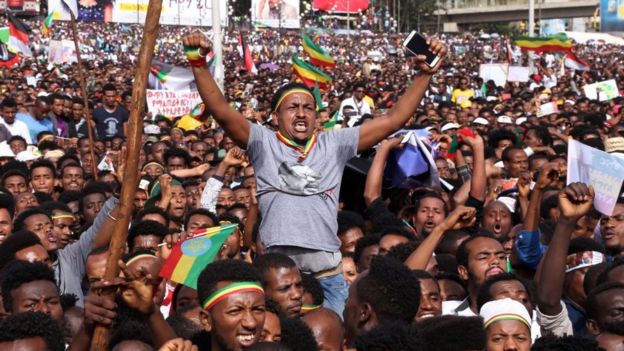 Image copyrightGETTY IMAGES
Image copyrightGETTY IMAGES
Image captionPro-democracy activists have welcomed the changes in Ethiopia
At 42 he is the youngest leader on the continent but his impact is far greater than his age suggests.
When the ruling Ethiopian People's Revolutionary Democratic Front (EPRDF) coalition elected him prime minister nine months ago the country, Africa's second largest in terms of population with more than 100 million people, shifted decisively from a long period of autocracy.
He ended a 20-year conflict with neighbouring Eritrea, freed thousands of political prisoners, unfettered the media and appointed women to half the cabinet posts.
Parliament also accepted his female nominees for president and head of the supreme court.
On top of that, he asked a dissident leader to return from exile in the United States to run the electoral commission.
![Quote: Thousands, if not millions, of people paid [a heavy price] to see this kind of change in this country](https://ichef.bbci.co.uk/news/624/cpsprodpb/E7D9/production/_105035395_datapic-bm1-a6zzt-nc.png)
The pace of change has delighted pro-democracy activists and thrown more reactionary elements off balance.
Fourteen years ago, Birtukan Mideksa spent 18 months in prison as leader of an opposition party before leaving for exile in the US.
She was as surprised as most observers when Mr Abiy invited her to return and chair the National Election Board.
"Thousands, if not millions, of people paid [a heavy price] to see this kind of change in this country… to see this opening," Ms Birtukan told me.
"To have a former opposition leader, former dissident, to lead an institution with significant independence of action... means a lot.
"For those people who paid a price in the process, it's really significant," Ms Birtukan added.
'Use ideas not weapons'
But change has inevitably emphasised the significant challenges still facing Mr Abiy.
When I caught up with him at a graduation ceremony for medical students in Jimma he appealed to them to "use ideas not weapons" and to follow the example of a nation like Japan, which recovered from World War Two to build a sophisticated economy.
Key facts: Abiy Ahmed
 Image copyrightGETTY IMAGES
Image copyrightGETTY IMAGES
- Born to a Muslim father and a Christian mother on 15 August 1976
- Speaks fluent Afan Oromo, Amharic, Tigrinya and English
- Joined the armed struggle against the Marxist Derg regime in 1990
- Served as a UN peacekeeper in Rwanda in 1995
- Entered politics in 2010
- Briefly served as minister of science and technology in 2016
- Became prime minister in April 2018
Ethiopia has one of the fastest growing economies in the world but still has a vast number of unemployed young people.
This is both a reservoir of potential talent and potential dissent if Mr Abiy's moves to liberalise the economy and tackle corruption do not succeed swiftly.
The prime minister was addressing the graduates in Jimma against a backdrop of deepening ethnic conflicts across the country.
Ethiopia has more than 80 different ethnic groups.
The divisions are old and deep rooted, but they flared up with a new intensity in the first half of last year when 1.4 million people were forced to flee ethnic conflict in the west of the country, according to the UN.
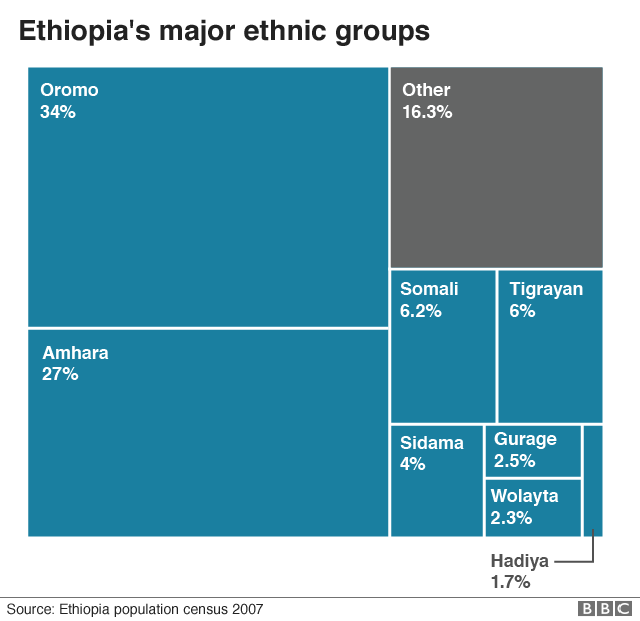
Overall, some 2.8 million people have been uprooted from their homes in recent years. The other major concern is the fighting on the borders of the Oromia and Somali regions.
Over decades, the central government used force and a whole battery of repressive legislation to quell ethnic unrest.
Predictably, this merely gave an impression of national cohesion while unaddressed grievances festered. They erupted into protest in 2016.
'Steel in Abiy's voice'
Demonstrations by members of the Oromo community - Ethiopia's largest ethnic group - precipitated the resignation of Prime Minister Hailemariam Desalegn and the election of Mr Abiy.
Mr Abiy is the first leader to come from the Oromo community but has stressed that he is a leader for all Ethiopians.
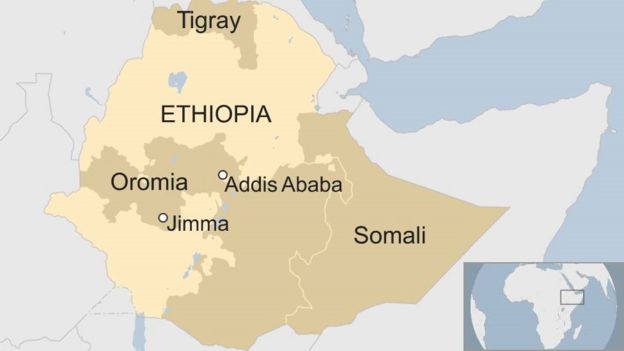
When I caught up with him in Jimma I asked if he was the man to unite an increasingly divided country.
He was being ushered away from the crowds by his guards but the question made him pause.
Looking around he caught my eye and shouted above the noise: "Of course I am. No doubt about it!" There was steel in the voice. And then the smile returned.
Last month, Mr Abiy established a reconciliation commission to deal with some of the issues.
This may provide an outlet for the airing of uncomfortable truths about the past but the greater challenge is the federal constitution which divides regional government along ethnic lines.
Respecting ethnic rights while fostering the idea of a nation will demand considerable political and legal sure-footedness.

Abiy's reforms in 2018
 Image copyrightAFP
Image copyrightAFP
Image captionPeople celebrated as the land border between Ethiopia and Eritrea was reopened
- May - frees thousands of political detainees
- June - lifts state of emergency
- July - alongside the Eritrean president declares the end of war between the two nations
- September - reopens land border with Eritrea
- October - appoints women to half of ministerial posts
- November - appoints ex-opposition leader to head electoral commission

In the Tigray region, in the north, there have been ominous stirrings.
Although Tigrayans compose only a small percentage of the population they dominated the previous government.
In recent months, prominent Tigrayans in the army, security services, as well as business figures, have been accused of human rights abuses and corruption.
Travelling in Tigray one frequently hears concerns about the alleged marginalisation of the once-powerful group.
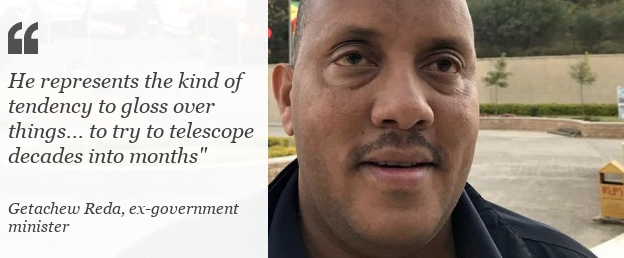
A former communications minister, Getachew Reda, told me he thought Tigrayans were being turned into scapegoats.
It was as if only Tigrayan leaders were responsible for past abuses under the ruling coalition, he said.
Although still calling himself a friend of Mr Abiy he believes the young leader risks creating a failed state.
"He symbolises the kind of ambition, the kind of courage to storm the heavens that youth would represent.
"But he also represents the kind of tendency to gloss over things, the kind of tendency to try to telescope decades into months, years… to rush things."
For the moment Mr Abiy has the momentum and no shortage of energy.
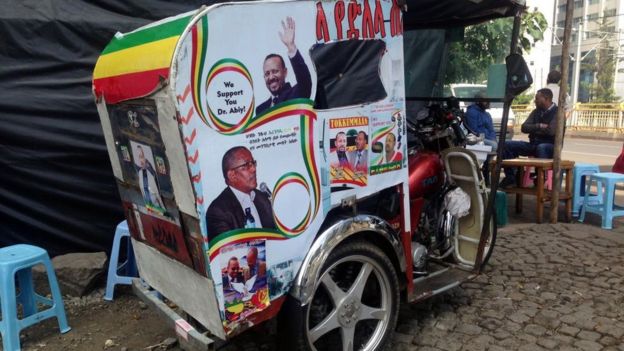 Image copyrightGETTY IMAGES
Image copyrightGETTY IMAGES
Image captionPrime Minister Abiy Ahmed plans to steer the nation to elections in 2020
Even in Tigray, the ordinary citizens I spoke to saw him as an inspirational figure.
Elsa Tesfaye is a small-holder farmer who lives close to the border with Eritrea and lost a brother to the war between the two nations.
For her Mr Abiy is the man who brought peace "and I thank him for that".
'Revivalist preacher'
She worries about ethnic divisions and whether her son - an engineering student - will be able to work in other parts of the country if the situation deteriorates.
"[The reforms] are great. But it still needs a bit of work. If ethnic conflict… and hate could be removed I would be satisfied."
Mr Abiy is a devout Pentecostal Christian and there is something of the revivalist preacher in the way he evangelises for his vision. He has the energy, the passion and the certainty.
The question is whether he can prevent an escalation of conflicts without resorting to the repressive methods of the past, and maintain his reformist momentum up to the next elections in 2020.

Read more about Ethiopia's reforms:
- The women smashing Ethiopia's glass ceiling
- Father reunited with long-lost daughters
- Making peace with 'Africa's North Korea'

Before he left Jimma I managed to speak with Mr Abiy again.
He greeted me with a traditional embrace and kiss. This was Mr Abiy being the consummate politician.
The world should look at the example of Ethiopia, he told me, to see how people can live together in peace. Given the vast numbers of displaced it seemed more a statement of ambition than reflective of any current reality.
But on the central question of reform he was adamant.
"Would anything stop you?" I asked.
"Not at all," he replied with a vehemence that left no room for doubt.
Latest Stories
-
Ada Chiefs urge government to ensure safety of Electrochem workers
18 minutes -
Local assembly elections must be partisan, current system hasn’t worked for 32 years – IDEG
23 minutes -
A Country Called Ghana: Lilwin reveals he paid Ramzy Noah over $40,000 for his role
30 minutes -
GFA confirms imminent changes to Black Stars technical team
41 minutes -
GCB Bank supports the attainment of 5-Ps of Sustainable Development – MD at New Year School
42 minutes -
Minority ready to cooperate with Majority for swift formation of new gov’t – Manhyia South MP
48 minutes -
Armah-Kofi Buah Writes: Urgent Call to Action: Fishermen in Kamgbunli face devastating fish disease crisis
54 minutes -
Free SHS: GH₵ 7.50p feeding fee per student not enough – CHASS
1 hour -
Minority caucus is not afraid of ORAL team – John Darko
1 hour -
Daily Insights for CEOs: The art of strategic networking – Expanding your influence as a CEO
1 hour -
Energy grids in Ghana and West Africa: Assessing access, reliability, and sustainability for actionable solutions
1 hour -
Haruna Iddrisu for Education Ministry as Mahama nominates 9 more ministers
2 hours -
Abla Dzifa Gomashie nominated as Minister for Tourism, Culture and Creative Arts
2 hours -
Christmas festivities: Retail sales value increased by18% – Maverick Research
2 hours -
Real estate development, construction drive economy growth, create jobs
2 hours

